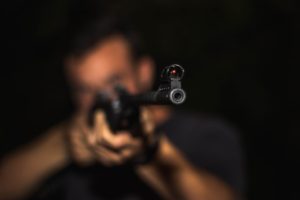School security experts agree that creating and following safety and security protocols are looming problems facing the educational community today.
“Despite having the most advanced security hardware money can buy, without hard and fast security protocols in place, and regular review and training, schools are still going to be vulnerable,” advises Sonitrol Great Lakes Education Market Director Clay Crost.
 On February 14, 2018, a former student with a gun caused 17 deaths and wounded 17 others at Marjory Stoneman Douglas High School in Parkland, Florida. He has admitted to the crime and awaits trial in Florida.
On February 14, 2018, a former student with a gun caused 17 deaths and wounded 17 others at Marjory Stoneman Douglas High School in Parkland, Florida. He has admitted to the crime and awaits trial in Florida.
Just two months before the tragedy at Stoneman Douglas High School, retired Secret Service agent, Steve Wexler, warned administrators that the school could be vulnerable to a gunman. The South Florida Sun Sentinel reported that Wexler was invited to analyze the school’s security and present his recommendations to four staff members. He was well-known among teachers at the school. Both of his children graduated from Stoneman Douglas, and he spoke regularly to classes about law enforcement.
Wexler retired from the Secret Service in 2014 after 27 years with the agency. He reported that gates were unlocked and unattended. Students did not wear identification badges. A fire alarm could send students streaming into the halls. Active-shooter drills were inadequate. The school’s policy required gates to be locked during the day, but Wexler said he found they were not. The shooter was able to get on campus because the gates were opened near the end of the school day.
Among Wexler’s recommendations:
- School gates should be locked during class hours and, if unlocked, they should be monitored by a staff member.
- Students and staff should wear ID badges showing they belong on campus.
- Security protocols should include running “active-shooter” drills periodically throughout the school year.
- Any adult should be able to declare a Code Red to lock down the school and minimize risk.
- Schools should not immediately evacuate students for a fire alarm without first confirming there’s a fire.
Wexler said he is aggravated that administrators ignored or minimized most of his recommendations.
What are the lessons learned from this sad moment in our history?
The Marjory Stoneman Douglas High School Public Safety Commission in Broward County, Florida, presented its final report in January 2019. The study was critical of police response and school administrators alike.
The Commission identified the lack of security planning as a critical factor in this tragic event. Lack of security planning leads to indecision when a situation arises that demands an immediate proactive response. Indecision is often mistaken for fear, or worse, apathy.
It is easy to point fingers in retrospect. The overwhelming majority of school administrators and staff are doing the best they can with the resources they have. Teachers cannot be expected to also be law enforcement professionals. School administrators are often overwhelmed by the dynamic demands on their time and shifting priorities. A common defense mechanism for coping with the stress and survivor guilt over this type of tragedy is to adopt the attitude of “That sort of thing will never happen here.”
The unfortunate reality in today’s world – as illustrated by the workplace shooting in Aurora, Illinois, this past week – is that it can happen anywhere at any time to anyone. Everyone needs to ask themselves what they would do if it happened in their school or their workplace on their watch?
Is your school or company security plan current and comprehensive, adequately coordinating between technology and security protocols?
Are your security protocols proactive?
Bill Cousins, a 30-year law enforcement veteran including a 22 years with the U.S. Secret Service, is a member of the Sonitrol Great Lakes team charged with providing security advice to protect school campuses, as well as commercial installations. Contact us to schedule a 360-assessment of your campus and find out where your vulnerabilities lie.
